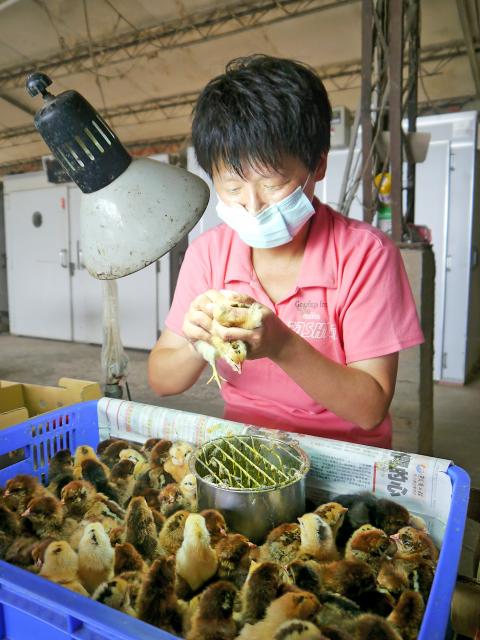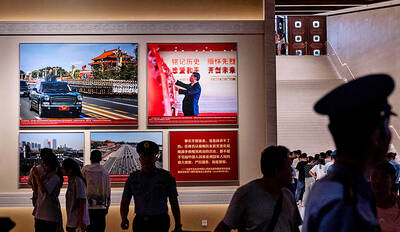Nantou County resident Lu Yao-ping (呂瑤萍), 49, has worked as a chick sexer since high school.
The profession of examining chicks to determine their gender was passed on to her by her father, who she worked under as an apprentice starting in her senior year of high school, Lu said.
A lot of experience is needed to develop the skill, Lu said, adding that she made many mistakes in her first year on the job.

Photo: Chang Hsuan-che, Taipei Times
Lu did not graduate from her apprenticeship until she was 20 years old, she said.
Sexing requires experience, because the identification is made solely by spreading the chick’s genitals and scrutinizing them for tiny sex organs, all of which is done by hand and with the naked eye, she said.
Chicks are frail, so using too much force could prove fatal, while prolonged exposure to lamp light is also unhealthy, she said.
The profession attracts few young people, because sexers must work surrounded by farm smells, which might cause allergies, Lu said, adding that a high tolerance for filth is necessary for the job, as the chicks often have feces on them.
“Chick sexing is a not a popular profession; almost everybody was born into it. I only know about a dozen sexers in central Taiwan,” she said.
Due to the high-skill and high-demand nature of the work, chick sexers are called in by farms all over the nation and an experienced sexer’s annual pay is about NT$1 million (US$33,028), Lu said.
Chick sexing is paid at a rate of about NT$0.5 per chick for most domestic chickens and NT$0.8 per chick for guinea fowls, as they are harder to examine, she said.
When asked about any strange or memorable incidents, Lu said she once worked at a farm that used too many hormones on the hens, which resulted in chicks that appeared to be female, but were actually found to be male after dissection.

Three batches of banana sauce imported from the Philippines were intercepted at the border after they were found to contain the banned industrial dye Orange G, the Food and Drug Administration (FDA) said yesterday. From today through Sept. 2 next year, all seasoning sauces from the Philippines are to be subject to the FDA’s strictest border inspection, meaning 100 percent testing for illegal dyes before entry is allowed, it said in a statement. Orange G is an industrial coloring agent that is not permitted for food use in Taiwan or internationally, said Cheng Wei-chih (鄭維智), head of the FDA’s Northern Center for

The Chinese military has built landing bridge ships designed to expand its amphibious options for a potential assault on Taiwan, but their combat effectiveness is limited due to their high vulnerability, a defense expert said in an analysis published on Monday. Shen Ming-shih (沈明室), a research fellow at the Institute for National Defense and Security Research, said that the deployment of such vessels as part of the Chinese People’s Liberation Army (PLA) Navy’s East Sea Fleet signals a strong focus on Taiwan. However, the ships are highly vulnerable to precision strikes, which means they could be destroyed before they achieve their intended

About 4.2 million tourist arrivals were recorded in the first half of this year, a 10 percent increase from the same period last year, the Tourism Administration said yesterday. The growth continues to be consistent, with the fourth quarter of this year expected to be the peak in Taiwan, the agency said, adding that it plans to promote Taiwan overseas via partnerships and major events. From January to June, 9.14 million international departures were recorded from Taiwan, an 11 percent increase from the same period last year, with 3.3 million headed for Japan, 1.52 million for China and 832,962 to South Korea,

REWRITING HISTORY: China has been advocating a ‘correct’ interpretation of the victory over Japan that brings the CCP’s contributions to the forefront, an expert said An elderly Chinese war veteran’s shin still bears the mark of a bullet wound he sustained when fighting the Japanese as a teenager, a year before the end of World War II. Eighty years on, Li Jinshui’s scar remains as testimony to the bravery of Chinese troops in a conflict that killed millions of their people. However, the story behind China’s overthrow of the brutal Japanese occupation is deeply contested. Historians broadly agree that credit for victory lies primarily with the Chinese Nationalist Party (KMT)-led Republic of China (ROC) Army. Its leader, Chiang Kai-shek (蔣介石), fled to Taiwan in 1949 after losing a